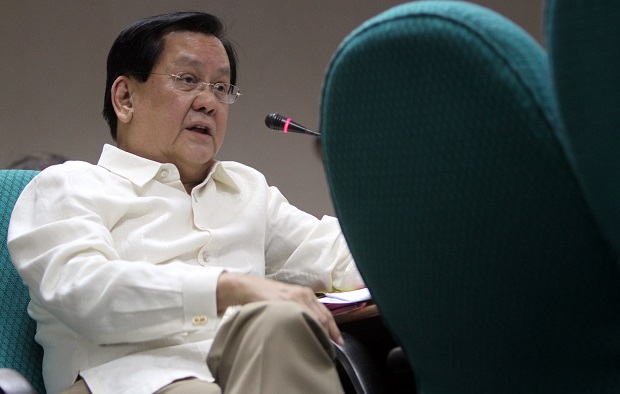Senate to probe $100-M money laundering case
The Senate will investigate the alleged laundering of $100 million in illicit funds through casinos in the country, with Sen. Sergio Osmeña III saying the exclusion of casinos from the coverage of the antimoney laundering law is one of its biggest loopholes.
READ: Senate to probe $100-M laundering via PH, says Osmeña
Even before the Senate could start its probe, the National Bureau of Investigation is already investigating a Chinese-Filipino who allegedly played a key role in the laundering operation.
“We are now looking into these illegal activities and are starting coordination with proper government agencies, including the Anti-Money Laundering Council (AMLC),” said NBI Director Virgilio Mendez.
Sen. Teofisto Guingona III, who heads the blue ribbon committee and the congressional oversight committee on the Anti-Money Laundering Act (Amla), will lead the hearing on Tuesday next week, Osmeña said on Thursday.
The AMLC will be invited, along with the foreign exchange broker and the banks involved in the transaction.
The Chinese-Filipino, who is known to the gambling community and has business interests in Manila, is suspected to be the conduit of the laundering activities, a source privy to the investigation said.
The laundered money, said to be the single largest transaction of dirty money in the country, “had already been sent out,” said the source, who asked not to be named because he was not authorized to talk about the probe.
High rollers
“The money did not stay in local banks. It was brought out through high rollers by junket operators,” the source said.
The AMLC is reported to have implemented a freeze order on several bank accounts suspected of being linked to the money laundering transaction.
The Inquirer earlier reported that some $100 million in illicit funds entered the local financial system through an inward remittance that was processed at a Makati branch of Rizal Commercial Banking Corp (RCBC).
The money was converted into pesos with the help of a foreign exchange and remittance firm called Philrem, and later consolidated from five bank accounts into a single corporate account of a businessman running an operation that brings in high rollers from overseas to play in casinos in the country.
The money was used to buy chips or pay for losses in three casinos.
Regulators were alerted to the suspicious origin of the money when foreign governments alerted the Bangko Sentral ng Pilipinas that it might have been obtained through fraud committed by computer hackers in Bangladesh. A ranking RCBC official also said the bank had filed suspicious transaction reports once it got wind of the transfer.
Osmeña, who chairs the Senate committee on banks, financial institutions and currencies, said the exclusion of casinos from Amla was “one of the biggest loopholes.”
“The casino is the easiest place to launder money in the entire country. It’s easy come, easy go there,” he said.
The money could be easily claimed as gambling winnings.
Aside from casinos, real estate brokers and art dealers should be covered by Amla as well, the senator said.
Osmeña, who is running for reelection, said he was willing to file a bill seeking new amendments to Amla to include casinos, real estate brokers and art dealers as among those required to report their financial activities.
The proposal could face opposition but the recent issue over the alleged use of casinos to clean dirty funds could shore up support for the amendments, he said. Passing the Amla in the first place had been very difficult, he recalled.
“The chances of passing it now are easier,” the senator said in a Senate forum.
Osmeña also said he was expecting the Paris-based Financial Action Task Force [FATF] to ask the Philippines to amend anew its law against money laundering given recent developments.
When Congress approved the amendments to strengthen Amla in 2013, casinos were excluded from coverage because of the strong lobby of gambling institutions, he said.
He said then Senate President Juan Ponce Enrile led the move to exclude casinos, on the ground that these comprised a new industry in the Philippines and the government should not make things hard for them.
The senators sided with Enrile, with Osmeña saying the lawmakers had to compromise. Otherwise, the bill to strengthen Amla would be held up.
At the time, Congress was about to go on recess for the 2013 election campaign, and the Amla amendments were needed to prevent the country from being placed on the FATF blacklist.
Because of the reported money laundering, the Securities and Exchange Commission (SEC) has expressed fears that the Philippines may be demoted to the “gray” list by FATF. TVJ
RELATED STORY
SEC fears PH demotion to ‘gray’ list over dirty money















